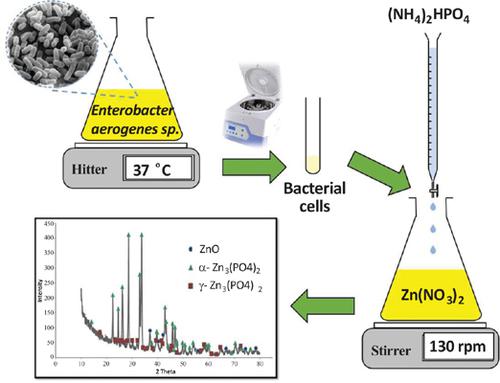Current Pharmaceutical Biotechnology ( IF 2.2 ) Pub Date : 2020-09-30 , DOI: 10.2174/1389201021666200506073534 Mona Sadeghi-Aghbash 1 , Mostafa Rahimnejad 1 , S Masoomeh Pourali 1

|
Background: The promising properties of Zinc Phosphate (ZnP) Nanoparticles (NPs) have made them come into prominence as one of the most favorable catalysts in various industries with ever- increasing applications. Among several proposed synthetic methods, biological methods have mostly been desired for their sheer person-environment compatibility in comparison with those of chemical and physical ones.
Objective: Therefore, the synthesis of ZnP NPs via biological route was developed in this study.
Method: Herein proposed a facile, applicable procedure for ZnP NPs via biosynthesis route, which included precipitation of Zinc Nitrate (Zn(NO3)2.6H2O) and diammonium hydrogen phosphate ((NH4)2HPO4) in the presence of Enterobacter aerogenes as the synthetic intermediate. Investigation of the anti-corrosion behavior of the synthesized NPs was explored on carbon steel in the hydrochloric acid corrosive environment to provide deeper insight into their unique anti-corrosion properties. Additionally, their antibacterial activities were also examined against Escherichia coli, Staphylococcus aureus and Streptococcus mutans.
Results: The results of X-ray Diffraction (XRD), Fourier Transform Infrared (FTIR) spectroscopy, Field Emission Scanning Electron Microscope (FE-SEM) and the Energy Dispersive X-Ray Spectroscopy (EDS) analyses confirmed the successful synthesis of ZnP NPs. Moreover, the examinations of both anti-corrosion and antibacterial properties, revealed that the synthesized NPs could be a promising anti-corrosion/antibacterial agent.
Conclusion: ZnP NPs with an average size of 30-35 nm were successfully synthesized via the simple, suitable biological method. Results implied that these particles could be used as a non-toxic, environmentally friendly, corrosion-resistant and antibacterial agent instead of toxic and uneco-friendly ones.
中文翻译:

使用产气肠杆菌细胞生物介导的磷酸锌纳米颗粒的合成和表征,用于抗菌和防腐应用。
背景:磷酸锌 (ZnP) 纳米颗粒 (NP) 的前景广阔的特性使其成为各行各业中最受青睐的催化剂之一,应用不断增加。在提出的几种合成方法中,与化学和物理方法相比,生物方法因其纯粹的人与环境相容性而备受青睐。
目的:因此,本研究开发了通过生物途径合成 ZnP NPs。
方. 研究了合成 NPs 在盐酸腐蚀环境中对碳钢的防腐行为,以更深入地了解其独特的防腐性能。此外,还检查了它们对大肠杆菌、金黄色葡萄球菌和变形链球菌的抗菌活性。
结果:X 射线衍射 (XRD)、傅立叶变换红外 (FTIR) 光谱、场发射扫描电子显微镜 (FE-SEM) 和能量色散 X 射线光谱 (EDS) 分析的结果证实了 ZnP NPs 的成功合成. 此外,对防腐和抗菌性能的测试表明,合成的 NPs 可能是一种很有前途的防腐/抗菌剂。
结论:通过简单、适宜的生物学方法成功合成了平均粒径为30-35 nm的ZnP NPs。结果表明,这些颗粒可以用作无毒、环保、耐腐蚀和抗菌剂,而不是有毒和不环保的。











































 京公网安备 11010802027423号
京公网安备 11010802027423号